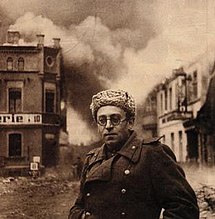You can help expand this article with text translated from the corresponding article in French. (May 2022) Click [show] for important translation instructions.
|
Vasily Grossman | |
|---|---|
 | |
| Born | Iosif Solomonovich Grossman 12 December 1905 Berdichev, Kiev Governorate, Russian Empire |
| Died | 14 September 1964 (aged 58) Moscow, Soviet Union |
| Occupation | Writer, journalist |
| Nationality | Soviet Union |
| Period | 1934–1964 |
| Subject | Soviet history World War II |
| Notable works | Life and Fate Everything Flows |
| Spouse | Anna Petrovna Matsuk
(m. 1928; div. 1933)Olga Mikhailovna (m. 1936) |
Vasily Semyonovich Grossman (Russian: Васи́лий Семёнович Гро́ссман; 12 December (29 November, Julian calendar) 1905 – 14 September 1964) was a Soviet writer and journalist. Born to a Jewish family in Ukraine, then part of the Russian Empire, Grossman trained as a chemical engineer at Moscow State University, earning the nickname Vasya-khimik ("Vasya the Chemist") because of his diligence as a student. Upon graduation, he took a job in Stalino (now Donetsk) in the Donets Basin. In the 1930s he changed careers and began writing full-time, publishing a number of short stories and several novels.
At the outbreak of the Second World War, Grossman was engaged as a war correspondent by the Red Army newspaper Krasnaya Zvezda; he wrote first-hand accounts of the battles of Moscow, Stalingrad, Kursk, and Berlin. Grossman's eyewitness reports of a Nazi extermination camp, following the discovery of Treblinka, were among the earliest accounts of a Nazi death camp by a reporter.
There is some dispute over the extent of the state repression Grossman endured after the war. While he was never arrested, his two major literary works (Life and Fate and Everything Flows) were censored by Nikita Khrushchev's government as unacceptably anti-Soviet. At the time of Grossman's death from stomach cancer in 1964, these books remained unreleased. Hidden copies were eventually smuggled out of the Soviet Union by a network of dissidents, including Andrei Sakharov and Vladimir Voinovich, and first published in the West in 1980, before appearing in the Soviet Union in 1988.